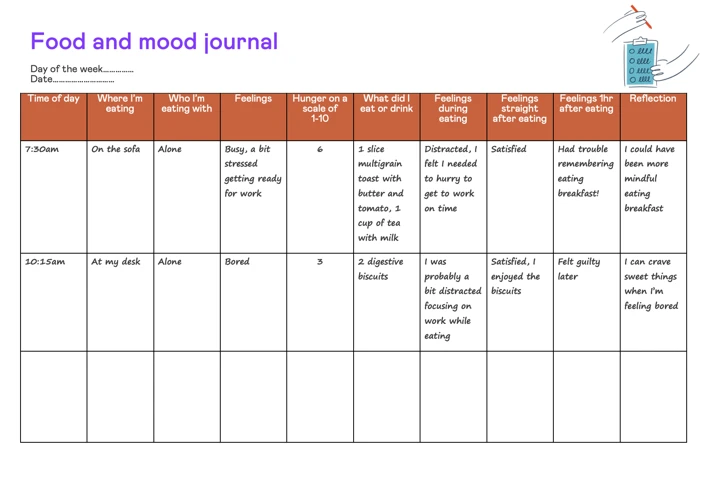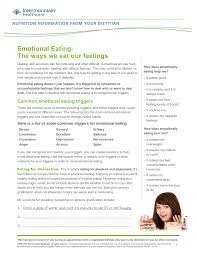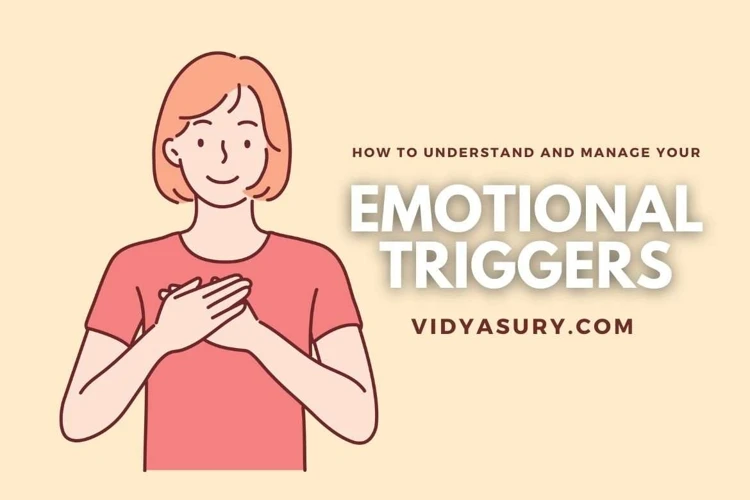Have you ever found yourself reaching for unhealthy snacks or overeating when you’re feeling stressed or overwhelmed? Do you feel like you’re not in control of your eating habits, especially when it comes to emotional triggers? You’re not alone. Many people struggle with emotional overeating, and it can be challenging to break the cycle. Understanding your emotional triggers is the first step in taking control of your eating habits, and this article will provide you with useful strategies for identifying and conquering them. So, if you’re ready to take charge of your emotional eating habits, keep reading.
What are Emotional Triggers?

Understanding the factors that influence our behavior and emotions can be a perplexing process. And when it comes to overeating, identifying the emotional triggers that lead to this behavior can be particularly challenging. Emotional triggers are certain circumstances or experiences that prompt a person to turn to food as a coping mechanism. These triggers may be related to internal emotional states, external events or even certain environments. By identifying emotional triggers, individuals can take important steps towards gaining a better understanding of their relationship with food and addressing any underlying emotional issues that may be driving their overeating habits.
Examples of Emotional Triggers
Emotional triggers are events, emotions, or situations that cause a person to feel overwhelmed, anxious, or stressed. In some cases, these triggers can lead to overeating as a way to cope with difficult emotions.
Here are a few examples of emotional triggers that may lead to overeating:
| Emotional Trigger | Description |
| Anxiety | Feelings of nervousness, worry, or fear that can be triggered by various situations such as public speaking, social interactions or work-related stress. |
| Sadness | Feeling of melancholy or sorrow caused by various situations such as grief, loss of a job, or a breakup. |
| Boredom | Feeling of restlessness, dissatisfaction or lack of interest in activities that can arise from unstimulating or dull situations, such as a day spent indoors or a tedious job. |
| Stress | Experiencing tension or pressure, whether it comes from work, family, or daily life. |
| Loneliness | Feelings of isolation, disconnection from others, or lack of meaningful relationships with others. |
| Anger | Experiencing feelings of hostility, frustration, or antagonism that can be triggered by various situations such as feeling disrespected or attacked. |
| Exhaustion | Feeling of tiredness and depletion of energy after intense physical or mental strain. |
It’s important to identify our emotional triggers so that we can develop alternative coping mechanisms to overeating. By recognizing what triggers us, we can manage our emotions more effectively and prevent ourselves from turning to food as a way to deal with difficult feelings.
The Role of Emotions in Overeating

Many of us have experienced using food as a form of comfort, whether we’re aware of it or not. Have you ever found yourself reaching for a sugary snack after a stressful day? Or mindlessly munching on chips while feeling bored or sad? These are common examples of how emotions play a significant role in our eating habits. It’s important to understand how emotions affect our relationship with food if we want to break the cycle of overeating.
How Emotions Affect Eating Habits
The connection between emotions and eating habits is complex and can be triggered by a variety of factors. Emotions have a significant impact on our food choices and the quantity of food we consume. Understanding how our emotions affect our eating habits is key to breaking the cycle of emotional eating.
Positive emotions can result in overeating: When we feel happy or joyful, we often celebrate with food. For example, we might indulge in a slice of cake or order a large pizza after a promotion or a successful project at work.
Negative emotions can trigger overeating: When we experience negative emotions like stress, anxiety, or sadness, we tend to seek comfort in food.
In situations like these, we often turn to unhealthy, high-calorie foods like junk food, fast food, and sweets, which give us immediate pleasure but can ultimately lead to negative feelings about our body and self-esteem.
Certain emotions can lead to specific food cravings: For instance, when we feel stressed, we tend to crave salty, high-fat foods, while when we feel sad, we crave sugary treats.
Understanding our specific food cravings can help us identify our emotional triggers and develop strategies for managing them.
Emotional eating can become a habit: Over time, eating to cope with emotions can become a habit. Our body starts to associate certain emotions with specific foods, and we may start to crave them even when we don’t feel the associated emotions. To break this cycle, we need to identify and address the underlying emotions, rather than turning to food as a solution.
Overall, our emotions play a significant role in our eating habits. Being aware of the link between our emotions and our food choices can help us develop healthier eating habits and address any emotional triggers that may be contributing to overeating.
| Emotions | Food Choices |
|---|---|
| Positive emotions | Celebratory foods (cake, pizza) |
| Negative emotions | Unhealthy comfort foods (junk food, sweets) |
| Stress | Salty, high-fat foods |
| Sadness | Sugary treats |
How to Identify Your Emotional Triggers

Identifying emotional triggers is a crucial step in overcoming overeating habits. When we understand the emotions that lead us to overeat, we can develop healthier coping mechanisms and break the cycle of emotional eating. But how exactly do we identify these triggers? There are several strategies that can help, including keeping a food diary, journaling your emotions, and practicing mindful eating. In this section, we’ll explore these techniques in more detail and provide tips for effectively identifying your own emotional triggers.
Keeping a Food Diary
One effective way to identify your emotional eating triggers is by keeping a food diary. This involves documenting everything you eat, as well as the circumstances surrounding your eating habits.
What to include in your food diary:
| Food and Drink | Quantity | Time and Date | Location | Emotions Experienced |
|---|---|---|---|---|
| Chicken Alfredo | 1 plate | Monday, 4/5/2021 6:30pm | At home | Loneliness, boredom |
| Chocolate cake | 1 slice | Saturday, 4/10/2021 2:00pm | At a friend’s party | Social anxiety, stress |
| Salad | 1 bowl | Wednesday, 4/14/2021 12:00pm | At work | Content, productive |
In addition to recording what you eat, it’s important to note the quantity consumed, as larger portions may indicate emotional eating. Including the time and date of each meal or snack can also help you identify patterns in your eating habits.
However, perhaps the most crucial aspect of keeping a food diary is documenting the emotions you experienced before, during, and after eating. This can give you insight into the reasons behind your food choices and enable you to recognize emotional triggers. For example, if you notice that you tend to eat sugary snacks when feeling stressed or anxious, you could try finding alternative stress-relieving techniques that don’t involve food.
Keeping a food diary can be an effective tool for identifying emotional eating triggers and making positive changes to your relationship with food.
Journaling Your Emotions
One of the best ways to identify emotional triggers for overeating is through journaling your emotions. This involves creating a record of your feelings throughout the day, along with any instances of overeating or cravings that you experience. A detailed log of your emotional responses to different situations can help you identify patterns and triggers that may be contributing to your overeating habits.
To get started with journaling your emotions, start by setting aside time each day to reflect on your feelings. This might involve taking a few minutes when you wake up or before you go to bed to jot down your thoughts. You may also find it helpful to carry a notebook with you throughout the day to record any emotions that arise in response to different situations.
When journaling your emotions, try to be as specific as possible. Rather than simply writing down “sad” or “stressed,” describe the situation that caused the emotion and how it made you feel. For example, you might write “I felt overwhelmed and stressed when my boss gave me a last-minute deadline at work.”
In addition to recording your emotions, be sure to also document any instances of overeating or cravings. Note what you ate, how much you ate, and how you were feeling at the time. This can help you identify triggers that may be driving your overeating habits.
By journaling your emotions regularly, you may start to notice patterns in your emotional responses. For example, you may find that you tend to overeat when you’re feeling stressed or anxious, or that certain social situations trigger cravings. Once you’ve identified your emotional triggers, you can start to develop strategies for managing them, such as practicing relaxation techniques or avoiding certain triggers altogether.
Journaling your emotions can be a powerful tool for identifying emotional triggers for overeating. By keeping a record of your emotional responses and eating habits, you can gain insight into your behavior and develop more effective strategies for breaking the cycle of emotional eating.
Mindful Eating Practices
One way to identify emotional triggers for overeating is to practice mindful eating. This involves paying close attention to the sensations and emotions that arise during meals. Here are some techniques for incorporating mindful eating practices into your daily routine:
| Practice | Description |
|---|---|
| Awareness of Physical Hunger | Before eating, assess your physical hunger on a scale of 1-10. Eat slowly to allow yourself time to feel full, and stop eating when you’re at a 6-7 level of fullness. |
| Mindful Breathing | Before beginning a meal or snack, take a few deep breaths and focus on your breath moving in and out of your body. This can help to calm and center you, reducing the likelihood of emotional overeating. |
| Observing Thoughts and Feelings | While you eat, take note of any thoughts or feelings that arise. Are you experiencing stress, boredom, or anxiety? Acknowledge these feelings without judgment. |
| Paying Attention to Tastes and Textures | Focus on the flavors and textures of the food you’re eating. Take small bites, chew slowly, and savor each mouthful. This can help you to enjoy food more fully and reduce the urge to overeat. |
By incorporating mindful eating practices into your daily routine, you can gain a deeper understanding of your eating habits and emotional triggers. With practice, you may find that you’re able to identify and address these triggers before they lead to overeating.
Breaking the Cycle of Emotional Eating
For many people who struggle with overeating, eating has become a coping mechanism for dealing with difficult emotions. However, this cycle of emotional eating can be difficult to break without the right tools and support. It’s important to understand that there are healthier ways to cope with emotions and that breaking this cycle is possible. In this section, we’ll explore some strategies for breaking the cycle of emotional eating and developing healthier habits.
Healthy Coping Mechanisms
When it comes to breaking the cycle of emotional overeating, healthy coping mechanisms are essential. Here are some techniques that can help:
- Exercise: Moving your body is a great way to release endorphins and reduce stress. Engaging in regular exercise can improve mood and boost self-esteem.
- Meditation: Practicing meditation or deep breathing exercises can help you calm your mind and reduce feelings of anxiety or stress.
- Hobby: Finding a leisure activity that you enjoy, such as reading or painting, can provide a healthy distraction and give you a sense of accomplishment outside of food-related activities.
- Positive self-talk: Changing the way you speak to yourself can be incredibly powerful. Instead of criticizing yourself, practice positive affirmations that will boost your self-esteem and reduce negative feelings.
- Self-care: Taking care of yourself physically and mentally is crucial. Activities such as taking a relaxing bath, practicing good hygiene, or getting enough sleep can help you feel good about yourself and reduce stress levels.
Remember that different techniques work for different people. Experiment with different coping mechanisms until you find what works best for you. It’s important to note that healthy coping mechanisms may take time to integrate into your life, but they are worth the effort.
Seeking Support from Loved Ones
Dealing with emotional triggers for overeating can be a difficult journey to navigate alone. It is important to reach out to loved ones for support. Here are some ways they can help:
- Listen without judgement: Talking to someone about your struggles with emotional eating can be scary, but having someone who will listen without judgement can be incredibly helpful. Ask your loved one if they can simply listen while you vent your emotions.
- Encourage healthier habits: Ask your loved ones to help you establish healthier eating habits by setting goals and celebrating milestones together. This can be a great way to stay accountable and motivated.
- Provide distractions: Sometimes emotional eating can be triggered by boredom, stress or anxiety. Your loved ones can help distract you from these triggers by doing activities with you that you enjoy.
- Offer emotional support: Emotional eating often stems from difficult or overwhelming feelings. Having someone to provide emotional support can help you cope with these feelings in a healthier way.
Remember, it can be difficult to open up to loved ones and ask for help. But having a support system in place can make all the difference in breaking the cycle of emotional eating.
Professional Support and Therapy
One of the most effective ways to break the cycle of emotional overeating is to seek professional support and therapy. There are several modalities of therapy that can be helpful for those struggling with emotional eating. Here are a few examples:
| Therapy Modality | Description |
|---|---|
| Cognitive-behavioral therapy (CBT) | A type of therapy that helps individuals identify and change negative thought patterns and behaviors. CBT can be particularly helpful for those struggling with emotional eating because it can help individuals become aware of their triggers and develop coping strategies. |
| Interpersonal therapy (IPT) | A type of therapy that focuses on improving communication skills and building healthy relationships. IPT can be helpful for those struggling with emotional eating because it can help individuals address underlying emotional issues that may be contributing to overeating. |
| Mindfulness-based interventions | Interventions such as mindfulness-based stress reduction (MBSR) and dialectical behavior therapy (DBT) can be helpful for those struggling with emotional eating because they can help individuals develop mindfulness skills and emotional regulation strategies. |
| Acceptance and commitment therapy (ACT) | A type of therapy that focuses on accepting difficult emotions and living in alignment with one’s values. ACT can be helpful for those struggling with emotional eating because it can help individuals develop acceptance and self-compassion, which can reduce the need to turn to food for comfort. |
Working with a therapist or counselor who specializes in treating emotional eating can be a powerful way to break the cycle of overeating. A therapist can help individuals identify their emotional triggers, develop coping strategies, and address underlying emotional issues that may be contributing to overeating.
It’s important to note that therapy is not a quick fix and it may take time to see significant progress. However, with consistent effort and support, therapy can be a highly effective way to overcome emotional overeating and improve overall emotional well-being.
Conclusion
After learning about emotional triggers for overeating and how to identify them, it’s important to take action towards breaking the cycle of emotional eating. It’s important to remember that emotional eating is a common experience, and it’s not something to be ashamed of. However, it’s essential to recognize the impact it can have on your health and well-being.
To effectively break the cycle of emotional eating, it’s important to find healthy coping mechanisms. These can include activities such as exercise, meditation, or spending time with loved ones. It’s also essential to seek support from those around you, friends, and family members, who can be a great source of motivation and encouragement.
If you’re struggling with emotional eating, seeking professional support and therapy can also be an effective way to break the cycle. Talking to a therapist can give you the tools you need to identify your emotional triggers and develop healthy coping mechanisms.
In conclusion, by identifying your emotional triggers and finding healthy ways to cope with them, you can break the cycle of emotional eating and improve your physical and mental health. Remember, it’s okay to make mistakes, and it’s okay to seek help when you need it. With time and effort, you can overcome emotional eating and develop a healthy relationship with food.
Frequently Asked Questions
How do emotional triggers lead to overeating?
Emotional triggers can cause intense negative emotions, leading individuals to turn to food as a coping mechanism and a temporary escape from these feelings.
What are some common emotional triggers for overeating?
Common emotional triggers include stress, anxiety, boredom, loneliness, and depression.
How can journaling your emotions help identify triggers for overeating?
Journaling can help individuals identify patterns in their emotional states and behaviors, allowing them to better recognize and address emotional triggers for overeating.
What is mindful eating, and how can it help identify emotional triggers?
Mindful eating involves being fully present and aware of one’s eating experience. This can help individuals identify not only what they are eating, but also why they are eating and whether emotions are influencing their food choices.
What are some healthy coping mechanisms for breaking the cycle of emotional eating?
Healthy coping mechanisms include exercising, practicing relaxation techniques, engaging in hobbies or interests, and seeking therapy or counseling.
How can friends and family members provide support in breaking the cycle of emotional eating?
Friends and family can provide emotional support, encouragement, and accountability to individuals working to break the cycle of emotional eating. They can also help provide healthy distractions and activities to engage in instead of overeating.
What are some professional resources available for individuals struggling with emotional eating?
Professional resources include therapists, counselors, and nutritionists who specialize in emotional eating and can provide personalized strategies and support for breaking the cycle.
Can someone overcome emotional eating on their own?
While it is possible for some individuals to successfully overcome emotional eating on their own, seeking support from a professional or loved ones can greatly increase the chances of success and provide additional resources and guidance.
Is emotional eating a sign of weakness?
No, emotional eating is a common coping mechanism and is not a sign of weakness. It is important to recognize and address emotional triggers for overeating and seek support if needed to develop healthier coping mechanisms.
Can medication help with emotional eating?
In some cases, medication may be prescribed to help manage underlying mental health conditions that contribute to emotional eating. However, it is important to work closely with a healthcare provider to determine the best treatment plan for each individual.







